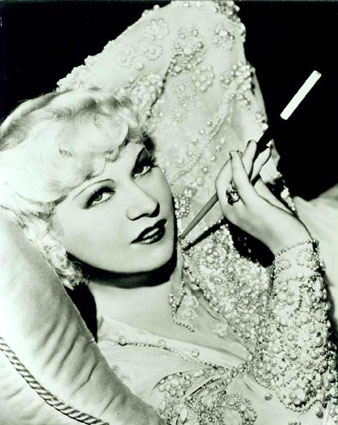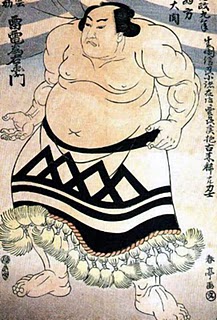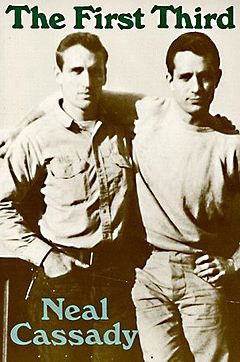« May 02, 2010 - May 08, 2010 | Main | May 16, 2010 - May 22, 2010 »
May 15, 2010
"Hey, is that an elected county judge in your pocket?"

"Or are you just hugely happy to see me?"
Even when popularly-elected judges are "good"--and, to be fair, there are some great ones--state systems that support those regimes will never inspire much confidence. Each of those jurists is steeped a taint.
Think of it like this: Good Crops, Motherhood, the Flag, Andy Griffith, puppies, selflessness, courage (Mae West, above, had lots of it), beauty, truth, a thin Marie Osmond, Sweetness and Light, and replacing state judicial elections with merit-based selection in 39 American states. These are among the enduring and good things in life.
Lest anyone worry that writers at this site are developing tolerance for enduring but dumb ideas on hearing and deciding disputes, we will reach out and try here to be frank, forthright, and clear.
The popular election of state judges is beneath: (a) you, (b) your law firm, (c) your family's dog, and (d) especially your clients, and especially if you act for businesses who trade nationally or globally. That institution, favored in a vast majority of states in some form, makes the states that still conduct them appear insular and potentially unfair to both American litigants and to non-Americans and their businesses abroad.
With each election cycle campaign donations are driving up the costs. This is, of course, wasteful and inefficient. See "The New Politics of Judicial Elections in the Great Lakes States, 2000–2008" by Justice at Stake. More importantly, the very existence of state laws regulating campaign contributions to candidates running for judicial office send two unintended but lousy messages:
1. Judges, like mayors and congressmen, have "constituents".
2. Justice, like real estate or widgets, is "for sale".
We appreciate that many of the some 10,000 elected American judges were excellent lawyers, and that as jurists they do first-rate, honest, exemplary, and often inspiring work. We have indeed stayed loose and open-minded on this subject.
Certainly, we are not prejudiced. Three or four of our friends are retired elected state judges. We say hello to them in public--and once even had one to dinner. We would probably not object too strongly if one of our sons or daughters, our cook Opal, or Opal's brother Roman, the gardener, very briefly dated or had a short meaningless affair with one, maybe.
But elected benches are by nature glaringly "fishy" (i.e., "...Hey and dang, Earl, the campaign money to the judge those guys gave last year...just don't seem right...") to even the most casual observer in the Midwest or South, and wherever else American horse sense abounds.
Merit-based selection is not perfect. However, it has worked very well for two centuries in American federal courts with a minimum of bad appointments and embarrassments--even if you adjust for the fact that state judges outnumber federal judges (who are appointed for life) by a factor of over 10 to 1.
It's time for the States to grow up, and adopt systems of merit-based appointment....
So quick and dirty re: elected state judges and campaign money.
Since 1996, persistently, and for nine years before we started this blog, Hull McGuire has written about this issue. More recently, we've followed and written a lot on the U.S. Supreme Court case about a popularly elected state supreme court judge, and campaign money recipient, who failed to disqualify himself in arguably suspect circumstances.
In that closely-watched case, see slip opinion in Caperton v. Massey Coal Company (June 8, 2009), the Court ruled last year that a West Virginia judge should indeed have disqualified himself from hearing an appeal of a $50 million jury verdict against an a coal company because its CEO had been a major campaign donor.
So the popular election of state judges--permitted in some aspect in a clear majority of the states--gives the appearance of justice being "for sale." Elected judges can be especially "bad" for good clients who do business all over the U.S. and the world. Even when elected judges are "good"--and, to be fair, there are some great ones--state systems of popularly-elected judiciary will never inspire much confidence.
Popularly elected jurists who hear and decide business disputes are steeped in a taint.
The point: Judges should not have "constituents," i.e. law firms, and their clients, who make campaign contributions. Right now, in most American states, they do. And there is no way to dress that up.
Generally county-based, American litigation at a state level is already frustratingly local and provincial for "outsider defendants"--businesses from other U.S. states and other nations sued in local state courts--who cannot remove to federal courts, the forums where federal judges can and should protect them from local prejudice.*
American states that still hang on to electoral systems look increasingly provincial, classless, and silly from a global perspective. Merit selection is not perfect--and also poses risks--but it is far better than what most American states currently have in place. It's time for American states to grow up. See our many past posts over the last four years on this subject in our category on the right side of this site: Federal Courts.
*One reason that federal diversity jurisdiction was created in the first place was because of the framers’ concern that prejudices of state judges toward out-of-state persons would unfairly affect outcomes in trial courts. Erwin Griswold, Law and Lawyers in the United States, 65 (Cambridge, Harv. Press 1964). Over 200 years later, our current systems in the states make that local prejudice almost inevitable. See also, the interview of General Electric's Mike McIlwrath in July 2009 of Prof. Geoffrey Hazard of Hastings Law School, who addresses why European business really fear U.S. state courts.
Posted by JD Hull at 12:47 AM | Comments (0)
May 13, 2010
NYC: You still feel like a religion.
"What of the cripple who hates dancers?"
-- جبران خليل جبران بن ميکائيل بن سعد
For all the hassles, if you live in or around around Manhattan, be grateful. You are daily taxed, stretched and tested. It's grow or die. But most New Yorkers more than survive. Smaller U.S. towns--the majority that shed their old skins in pain and slow motion--secretly envy New York City every moment.
Posted by Holden Oliver (Kitzbühel Desk) at 12:59 AM | Comments (0)
May 12, 2010
Tan, ready, and re-launched in Europe
A fine real-time resource on the European Court of Justice. About a month ago, in Utrecht, The Netherlands, Allard Knook re-launched his ECJBlog, where he covers the European Court of Justice in Luxembourg. It's even better than before. We do love the Dutch, as among other things, so many of them speak and write English beautifully. And especially in Amsterdam. But what's going on lately, with the men and women--okay, maybe just the men--of Amsterdam?
This wonderful city's women, in particular, do speak English (British or American) exceptionally well. Moreover, they are stunningly attractive, ultra-Nordic, very tall, energetic, confident and smart. Recently, however, Amsterdam's men--as a Brussels-based lawyer we know remarked last week--do "tend to look and act very much like, well, Moby." We have our reasons not to complain. Just curious. But it does seems to be deliberate and cultivated. What gives?

Name's Kleef. Buy you a Grolsch?
Posted by JD Hull at 11:59 PM | Comments (1)
May 11, 2010
A Man in Full: Duncan Campbell King

It is only through work and strife that either nation or individual moves on to greatness. The great man is always the man of mighty effort, and usually the man whom grinding need has trained to mighty effort.
--D.C. King, quoting Teddy Roosevelt, in a speech about U.S. Grant, Galena, Illinois, April 27, 1900*
No, no, he's not from Pittsburgh--too small, frail and well-read--but damn good guess. We admire Albion's new star Duncan Campbell King at Wrath of a Sumo King. Not just because he has given up all hope of ever behaving normally--and raised that to an art form. "I am Duncan Phebus Sumo Mercutius Steerpike Campbell King, Litigator Extraordinaire, and I do not want you to like me." But there's more, and a method here.
Yes, venting, sporting women and an American style "First Amendment" focus--but an un-conflicted, non-double standard one--are the main events. Like in olden days before we liberals ruined our speech and children with PC agendas--so your boys could grow up to sound like Mr. Rogers, Liberace, or maybe your great-grandmother in St. Cloud.
But through all his Triple-X venting on these subjects we also detect a great caring about quality, hard work, truth, beauty. Duncan is hereby given a Club Ned anonymity pass/exemption for life. Grounds: authentic, experimental, un-PC and feral.
Rise, Sir Duncan. Try not to maim anyone on the way out.
*Nota bene King's dictum to TeleTubbies, Teacups, Slackoisie, other New Age Looters: "Contrary to the horrific woolly bullshit you are fed it is a tough, competitive world."
Posted by Holden Oliver (Kitzbühel Desk) at 09:35 PM | Comments (2)
May 10, 2010
Nominee Kagan
The hearings start in about 6 weeks. The better coverage is at The Washington Post. Kagan, 50, and in most respects the perfect candidate, will win--but with a huge fight, featuring her strident 2004 "moral high road" (our term) dissing of military recruiters at HLS. See, e.g., The Dailey Caller.

Elena Kagan
Posted by Holden Oliver (Kitzbühel Desk) at 11:38 PM | Comments (0)
May 09, 2010
The man who found proof of lame lawyer habits.

Stand-Up Guys: Ernie (left), a dead-ringer for 1950s icon Neal Cassady, and WAP, during their pre-lawyer Beat years at Nathan's, a D.C. saloon for older players until July of 2009. Washington Examiner called on Nathans "a well-stocked, man’s bar, though the men brought lovely women."
Sir Ernie of Glen Burnie. Lawyers who won't take a stand is a time-honored tradition. Our hero, Ernie from Glen Burnie, who is not such a lawyer, is a life-long friend. He'll stand up for people who pay him--and people he just met on the subway.
It's his nature.
He stands up.
Ernie's "available" and "comes to play". He will tell you what he thinks. He will act. He is a trial lawyer with business sense.
Ernie played football for one of the Ivies. He thinks in terms of both collaboration and getting things done. He's smart but friendly. Guys' guy. Ladies' man. Lawyer's lawyer. Renaissance Human. Charmer. Playful rogue. A reveler in words.
He's a partner in a well-known DC law firm. (He does exist.)
He does not like "cookie cutter" thinking or people. If you need him, he's there. You don't have to ask.
Standing up for friends? "A pretty easy standard, and a no-brainer," he once told us. Stand up for friends, sure--but also for humans who need or deserve it. Do it for free.
Things you and your co-workers and friends have to think about for a long while? Ernie just does them. He always has--since grade school. Instinct. On gut. He never hesitates.
Even though he does securities litigation, if you are a GC, you can call him in the middle of the night with your insider-trading problem, or report that your kid at Dartmouth just thrashed a waiter and both Hanover cops.
He's very well-paid, our Ernie. But if you--you are an associate, client, paralegal, receptionist, messenger, street person--want, say, a cup of coffee, he does this amazing thing: he just gets you a cup of coffee. Just because. What a character.
And, best of all, as the Foggy Bottom, West End, M Street and Glover Park crowd will tell you, when he's not working, he's the kind of guy who never hits on married women over 40.
You can read Ernie's story--it's about an old parchment he claims was discovered in Alexandria, Virginia around the same time we both began practicing law in The District--at "The Seven Habits of Highly Useless Corporate Lawyers". This is a true story, mostly. So listen up.
Posted by JD Hull at 12:59 AM | Comments (0)